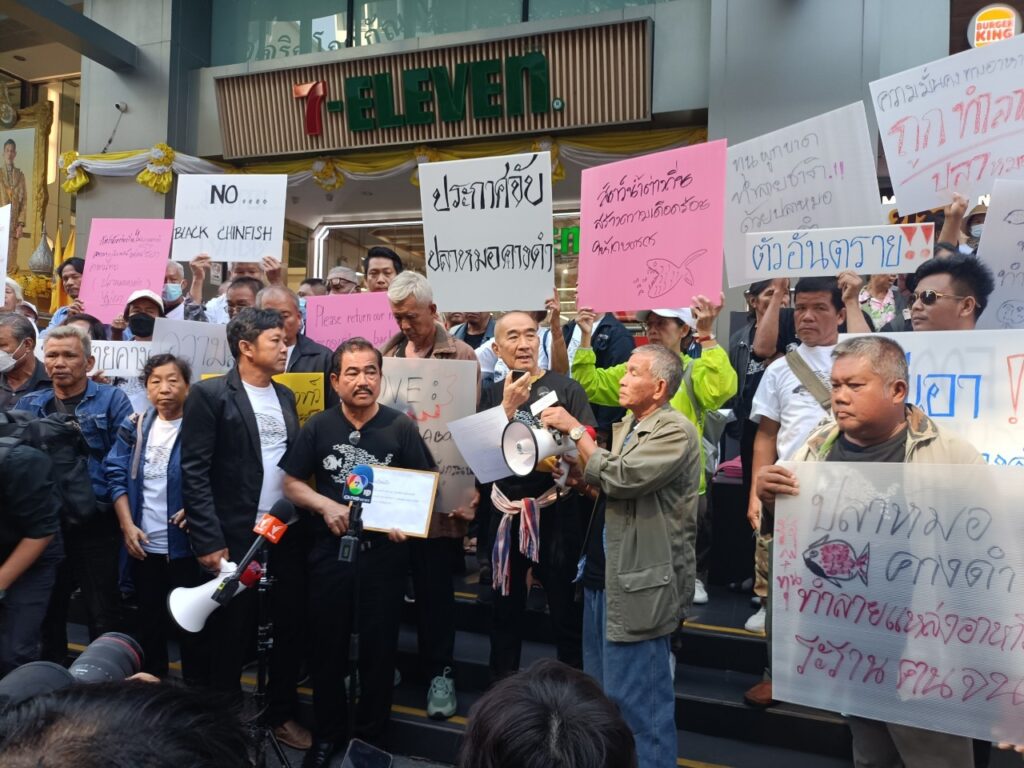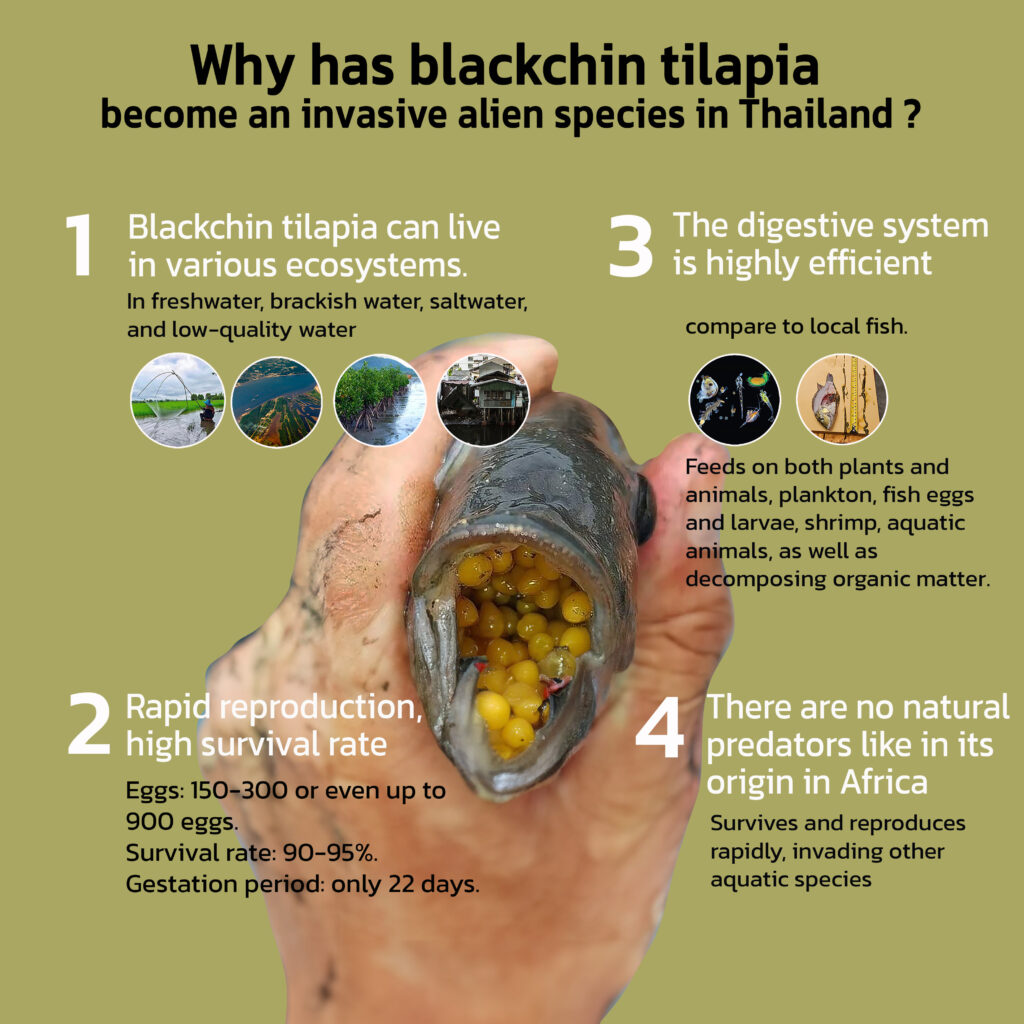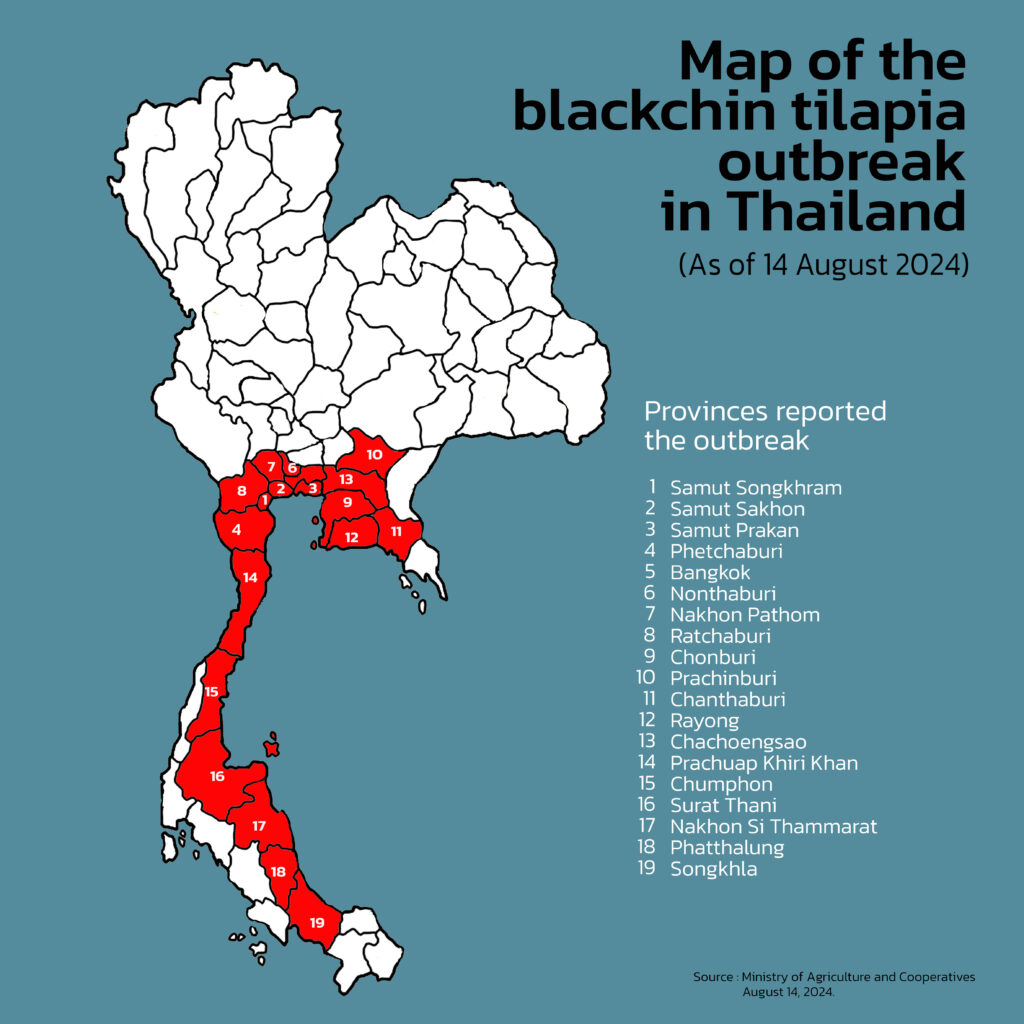The demands are as follows: eradicate blackchin tilapia in Thailand within the year 2025, set up a committee to investigate responsibility for the spread of blackchin tilapia, sue for damages, and declare disaster zones to facilitate urgent support to those impacted
Monday, 13 January 2025, Bangkok
Representatives of people affected by the spread of blackchin tilapia from 19 provinces, along with their supporters, mobilized in the area of Silom Road. Then, the group of over 200 people walked from the front of Silom Complex to CP Tower. Most of the people assembled wore T-shirts with the picture of many small fish coming together to chase one big fish, the symbol of the movement calling for CPF to take responsibility for the spread of blackchin tilapia in Thailand. The group held up various signs, for instance “Hold Accountable those Responsible for Environmental Damage” and “The One Who Brought Them In, Now Take Them Back Out.”
Mr. Tira Wongcharoen , a farmer leader from Chanthaburi Province, read out a statement calling for CPF – the only private company that has imported blackchin tilapia – to claim responsibility. After CPF imported the fish in the year 2010, the fish were found to have spread into the canals connected to CPF’s farm and into the area nearby. Mr. Wongcharoen said, “CPF made a statement at the end of 2024 that in the third quarter alone the company’s profits reached 7.3 billion baht. In its capacity as a public company, CP should redistribute some of these profits back to society to address problems like the spread of blackchin tilapia or other issues, for example PM 2.5 emissions.”


After reading the statement in front of CP Tower, the group reassembled in front of Gate 2 of the Government House. People made speeches about the situation and the negative impacts of blackchin tilapia, which by now have increased in population as well as spread even more widely. They are found in Bang Khun Thien District of Bangkok, Samut Sakhon Province, Samut Prakan Province, Samut Songkhram Province, and in the eastern part of the country in Chanthaburi Province.
Mr. Samart Sakawi from the Southern Food Security Network stated that: “At present blackchin tilapia have spread heavily over an area of hundreds of kilometers in the Pak Phanang River Basin area in Nakhon Si Thammarat Province and the Sathing Phra Peninsula in Songkhla Province. The blackchin tilapia have destroyed local fish varieties to the point that they’ve nearly vanished completely. Now these blackchin tilapia are likely to spread rapidly into Songkhla Lake, which is a key biodiversity hotspot of Thailand and of the world.” He continued, “The government must quickly address this problem for the sake of the people, not go along with the group of big investors who are trying to pressure Thai people into coexisting with the blackchin tilapia, which is unacceptable.”



Around 1:30pm, Mr. Panya Doktong, who has a leadership role among the farmers from Samut Songkhram Province, submitted to the government a statement with the following four demands:
- The Cabinet must establish an independent committee to investigate and identify the party responsible for the spread of blackchin tilapia. This committee must conduct its proceedings and complete its investigation within 30 days.
- The government must fast track the process to compensate the farmers and others negatively affected by the spread of blackchin tilapia. It must have the provinces urgently declare disaster zones according to the rules outlined by the Ministry of Finance for its disaster victim relief funds.
- The Cabinet must establish a committee at the national level and working groups at the provincial level for eradication of blackchin tilapia, restoration of ecosystems, and restoration of the livelihoods of farmers and of others impacted. They must set a goal to completely eradicate blackchin tilapia by the year 2026 and allocate a budget accordingly.
- Once the investigation is complete and has identified the responsible party, the government must bring legal charges against that party and carry out the litigation process. The party at fault will have to make reparations and pay for the damages, so that the costs of restoration do not fall to Thailand’s taxpayers.
“We call on the Prime Minister and the Cabinet to include an agenda item about these demands during the next Cabinet Meeting, and we expect a progress update about the first three demands within the next 15 days,” Mr. Doktong stated.
After submitting this statement at the Government House, the representatives of people affected by the spread of blackchin tilapia continued on to the Parliament. There, they submitted a statement to Mrs. Angkhana Neelapaijit,Chairperson of the Senate Commission on Political Development and Public Participation and the Senate Commission on Human Rights, Rights and Liberties, and Consumer Protection. The statement asked for these commissions to study the situation, propose strategies, and accelerate their work to address human rights violations from business operations, as in the case of the spread of blackchin tilapia. The people also submitted a statement to the Committee on Agriculture and Cooperatives of the House of Representatives, asking it to accelerate its work to address the problem of the spread of blackchin tilapia.
Before the representatives from the various provinces travelled back to their localities, Mr. Wongcharoen made a statement to the press, saying, “Scientists have pointed out that this problem of the spread of blackchin tilapia is the worst instance of destruction of ecosystems in the history of Thailand. But the government and its various agencies have not taken this problem seriously or worked to address it in a sustained way. We will give the government 15 days. If they continue with this silence and inaction, people from 19 provinces will soon be rallying for our rights – and we’ll come with tons of blackchin tilapia to deposit in front of the Government House.”
Statement presented to Paetongtarn Shinawatra, Prime Minister, on 13 January 2025
Topic: Take Urgent Action to Address the Spread of Blackchin Tilapia
To: The Prime Minister
The problem of the spread of blackchin tilapia in Thailand started in 2010 when a private company received permission from the Department of Fisheries to import these fish to Samut Songkhram Province and raise them there. Subsequently, the blackchin tilapia were found to have spread into seven canals nearby that private company’s farm. At present, blackchin tilapia have spread rapidly into 19 provinces with severe impacts on farmers and communities, ecosystems, and food security. The 19 provinces are as follows: Chanthaburi, Rayong, Chachoengsao, Samut Prakan, Nonthaburi, Bangkok, Nakhon Pathom, Ratchaburi, Samut Sakhon, Samut Songkhram, Phetchaburi, Prachuap Khiri Khan, Chumphon, Surat Thani, Nakhon Si Thammarat, Songkhla, Chon Buri, Phatthalung, and Prachin Buri.
In 2024 the government declared that the spread of blackchin tilapia was an item on the national agenda. It approved a budget in the amount of 450 million baht. A project was established in which people caught blackchin tilapia and the government bought them up, then processed them into a natural fertilizer. The project also involved releasing predatory fish to hunt the blackchin tilapia. But the government did not implement the project with sufficient dedication or take action on this issue in a sustained way. And now the blackchin tilapia have spread even farther, with severe impacts across many communities. Blackchin tilapia eat up all the food in the ponds and natural canals; they eat plankton and young aquatic animals. So the populations of shrimp, fish, mollusks, and crabs in the ponds have been devastated, along with other aquatic animals in natural water sources. Farmers who raise these animals in ponds or catch them in coastal areas have experienced huge losses. Many have gone into debt or lost their land, and some have even died by suicide, particularly in Samut Songkhram Province. According to information from the Council of Lawyers, farmers experienced economic losses in the amount of 2.486 billion baht. The additional damage to social systems and ecosystems is greater than many hundred billion baht, though even that is an under-estimate of the losses. An environmental scientist pointed out that this spread of blackchin tilapia is “the worst instance of destruction of ecosystems in the history of Thailand.”
Meanwhile, the private company that imported blackchin tilapia into the country in the first place still refuses to take responsibility. It claims that the imported blackchin tilapia all died within 16 days, and that it sent a sample of the dead fish to the Department of Fisheries. The Department of Fisheries, however, attests that it never received communication from the company on this matter, and the Department of Fisheries specimens logbook provides evidence that no sample fish was ever received either. An investigation by the National Human Rights Commission starting in 2017 found that the company did not proceed according to the conditions stipulated by the Department of Fisheries. Furthermore, there is genetic evidence: in 2017 the investigation compared the DNA of fish from the private company’s farm with the DNA of fish spreading across various provinces. It was found that “the populations of blackchin tilapia that are spreading across Thailand all have a common source” – indicating that the spread was not a result of “multiple import events.” Then in 2024 the Department of Fisheries compared the genetic information of blackchin tilapia collected from six provinces of Thailand between 2017 and 2022 with the DNA of groups of blackchin tilapia in the continent of Africa. The blackchin tilapia in Thailand were found to match genetically with the blackchin tilapia subgroup from the Ghana-Côte d’Ivoire area. Ghana was the source country for the blackchin tilapia that the private company imported in 2010.
Therefore, to conscientiously address the problem of the spread of blackchin tilapia, provide support for the people negatively affected, restore the ecosystems, and prevent similar problems from occurring in the future, our network of people requires the Prime Minister to consider the following:
- The Cabinet must establish an independent committee to investigate and identify the party responsible for the spread of blackchin tilapia. This committee must conduct its proceedings and complete its investigation within 30 days. The chairperson and committee members must be independent and must not have any conflicts of interest; they cannot be people under the influence of private companies. At least half must be people named in our network’s list of independent scholars and experts.
- The Cabinet must establish a committee at the national level and working groups at the provincial level for the eradication of blackchin tilapia, restoration of ecosystems, and restoration of the livelihoods of farmers and of others impacted. They must set a goal to completely eradicate blackchin tilapia by the year 2026 and allocate a budget accordingly. The budget allocated specifically for eradicating blackchin tilapia must be at least three times the budget used annually to get rid of water hyacinth. The national-level committee members must include farmers negatively affected by the spread of blackchin tilapia as representatives from every participating province. The committee must distribute its power and budget to the provincial-level working groups so that they can proceed in a decentralized way.
- Once the investigation of the committee described in point 1 is complete and has identified the responsible party, the Prime Minister/Cabinet must have the Ministry of Natural Resources and Environment – or any relevant government agency with the authority to do so – bring charges against that responsible party and carry out the litigation process. The party at fault will have to make reparations and pay for the damages and the costs of restoring the ecosystems to their previous state. This point is in accordance with the principle that any party that causes harm to the environment must take responsibility and must be the one to pay to address those harms. This way the costs of restoration do not fall to Thailand’s taxpayers.
We bring these points to the attention of the Prime Minister and expect consideration of this statement within 15 days, before the severe problem expands even more extensively.





